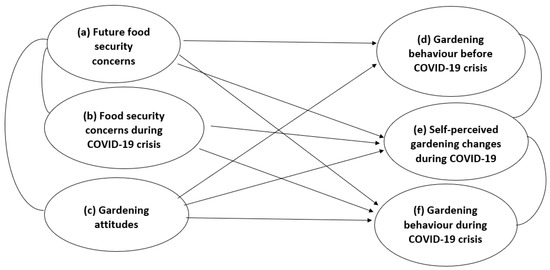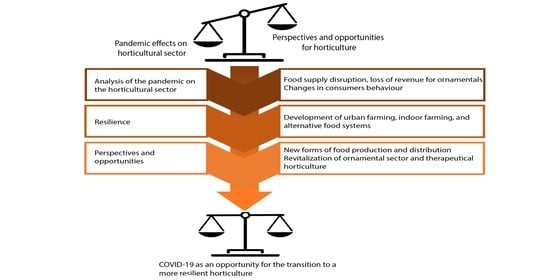Horticulture in the Time of COVID-19
A topical collection in Horticulturae (ISSN 2311-7524).
Submission Status: Closed | Viewed by 38426Editors
Interests: biostimulants; plant biofortification; abiotic stress; vertical farming
Special Issues, Collections and Topics in MDPI journals
Interests: horticulture; abiotic stress; biostimulant; soilless cultivation; microgreens; vegetable quality; ornamentals; postharvest quality
Special Issues, Collections and Topics in MDPI journals
Topical Collection Information
Dear Colleagues,
Coronavirus disease (COVID-19), caused by SARS-CoV-2, has led to a blockage in the supply of fresh food, highlighting the vulnerability of the global agri-food system. Lockdown measures have slowed down fresh produce supply in long-distance distribution chains and might have left communities in small towns with limited availability of food due to the lack of big grocery stores. The pandemic may have triggered disruptions in the food supply chain and, particularly, in fresh produce, both at commercial and household levels.
In addition, mobility restrictions have occurred in many countries, and social distancing has left people distressed and vulnerable, but also with a larger availability of spare time. This situation has led to a revitalization of home gardening. This global health problem has favored leisure activities related to flowers and ornamental plants, of which the therapeutic and calming effects are being increasingly recognized. Even self-care has occurred due to a higher demand for relief, highlighting the lack of access to botanicals.
How was horticulture affected by SARS-CoV-2? The aim of this Topical Collection is to gather knowledge regarding reactions to the pandemic that occurred worldwide in the horticultural sector and, also, on the confinement of people. This Topical Collection covers reviews and specific studies on how horticulture was influenced by the pandemic, considering changes in the food production and supply chain, in citizen’s behavior and demand for fresh food being locally vs. remotely produced and commercial vs. self-produced. In addition, reviews and case studies related to floriculture are pertinent, taking into account that the pandemic also caused a worldwide crisis in this sector and that the practice of activities such as gardening became important for health and wellbeing. New reactions and approaches to botanicals are also of interest. Prospects for resilience of the horticultural sector, enduring changes caused by SARS-CoV-2, are also welcome.
Dr. Andrea Ertani
Dr. Roberta Bulgari
Collection Editors
Manuscript Submission Information
Manuscripts should be submitted online at www.mdpi.com by registering and logging in to this website. Once you are registered, click here to go to the submission form. Manuscripts can be submitted until the deadline. All submissions that pass pre-check are peer-reviewed. Accepted papers will be published continuously in the journal (as soon as accepted) and will be listed together on the collection website. Research articles, review articles as well as short communications are invited. For planned papers, a title and short abstract (about 250 words) can be sent to the Editorial Office for assessment.
Submitted manuscripts should not have been published previously, nor be under consideration for publication elsewhere (except conference proceedings papers). All manuscripts are thoroughly refereed through a single-blind peer-review process. A guide for authors and other relevant information for submission of manuscripts is available on the Instructions for Authors page. Horticulturae is an international peer-reviewed open access monthly journal published by MDPI.
Please visit the Instructions for Authors page before submitting a manuscript. The Article Processing Charge (APC) for publication in this open access journal is 2200 CHF (Swiss Francs). Submitted papers should be well formatted and use good English. Authors may use MDPI's English editing service prior to publication or during author revisions.
Keywords
- coronavirus
- pandemic
- resilience
- innovation
- technology
- food supply chain
- urban horticulture
- floriculture
- urban landscape
- botanicals








